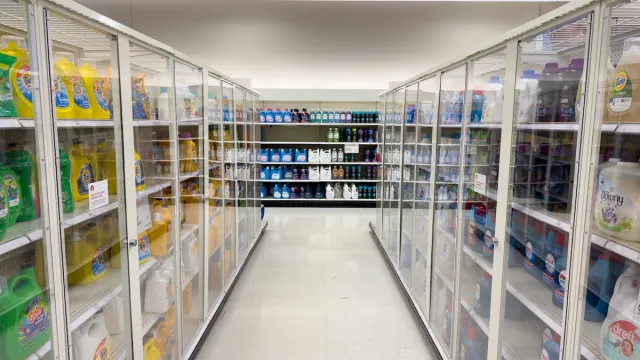Target Shoppers Are Walking Out Over “Punitive” Anti-Theft Measures

Target’s efforts in the fight against shoplifting, or “shrinking,” haven’t gone unnoticed. In recent months, the retailer’s self-checkout machines have become increasingly less accessible to customers due to newly imposed item limits and reduced hours of operation. These anti-theft measures, along with an increase in locked merchandise, are pushing some Target customers to shop elsewhere.
RELATED: Walmart and Target Anti-Theft Measures Could Be “Final Nail in the Coffin,” Shoppers Say.
On March 14, Target announced plans to implement Express Self-Checkout lanes (limited to 10 items or fewer) chainwide to help “deliver a joyful and convenient shopping experience.” The new change was, for the most part, well-received by customers—however, the tides quickly turned when Target added that it would also be slashing self-checkout hours of operation.
According to the press release, store leaders are now able to “set self-checkout hours that are right for their store.” In other words, self-checkout—and therefore Express Self-Checkout as well—may not always be open for business.
Redirecting customers to manned registers is one of the many ways Target is staying proactive amid the rise of organized retail crime. Displaying merchandise behind locked glass barriers is another form of security shoppers have noticed, too.
While restricting public access to commonly stolen goods may seem like a plausible solution to some, many customers claim these “punitive” changes are a major hindrance to the overall Target shopping experience.
On X, one user reposted a photo of a checkout line more than 15 people long that snaked through multiple beauty aisles. “This is the point where I leave the cart exactly where it is and walk out,” they captioned the post.
The person added that they’ve had to “[walk] out of Target more than a few times in the last few months.”
Elsewhere online, frustrated individuals pointed out that it’s rare nowadays to shop at Target and find something you need that’s not locked behind a glass cage. “Stuff being locked at target will make me walk right out,” one fed-up customer said.
One Target shopper shared, “Went into a Target in Bellevue and everything was locked up but the bread pretty much. Screw that. Whatever I need I can get elsewhere…Seemed punitive.”
“People won’t shop at stores where everything is locked up. People don’t want to wait around for employees to unlock every single item,” another stated on X.
The shopper continued in their rant about how locked cages don’t prevent thieves from “having employees unlock everything they want,” and walking out the door with unpaid merchandise.
“So what is the point of locking everything up?” they concluded.
TikToker Steve Owens believes the real culprit is Target, not the public. In a new clip, Owens explained how the retailer’s anti-theft measures are “robbing us blind” of our time and money.
“Y’all, people are not stealing because it’s fun. People are stealing because they have to. If you look at what’s locked up, it’s soap, deodorant, toothpaste, mouthwash, body wash. These are essential items, OK?” he said in the video.
Owens made a point to mention that home decor and other non-essential products aren’t behind cages—and these are typically the most expensive items.
During a recent Target trip, Owens said he paid $35 for mouthwash, body wash, toothpaste, and hand soap. He emphasized that people are “struggling” financially, and those who make medium wages are forced to “trade three hours of your life” for basic necessities.